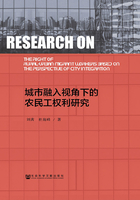
Abstract
Citizenization of rural-urban migrants is the core and hinge of China's urbanization. City integration is the essence of citizenization. Political integration Provides institutional assurance for economic and social integration, and reflects the rural-urban migrants' right in city. With the proposal of urbanization strategy and comprehensive promotion of household registration system reform, the external policy environment of rural-urban migrants' political integration is undergoing tremendous change. Rural-urban mobilization over the past 30 years has given rise to the structural differentiation of rural-urban migrants during the socialization course. The dual social, political and economic systems in rural and urban China are becoming increasingly unfavorable for the survival and development of vulnerable groups, severely influencing the political integration of ruralurban migrants. As for the system design, the urbanization policy adjustment embodies the government's great concern for the lack of political rights of rural-urban migrants in cities; however, what about the actual political integration of rural-urban migrants? Can they truly realize political integration? Further study is required. Currently, researches on political integration mainly focus on realization of political rights by combining social and economic conditions, which can hardly satisfy the demand of study on rural-urban migrants' political integration. Comprehensive study on the status quo and influence factors of rural-urban migrants' political integration by integrating new theories and combining the reality of rural-urban migrants is of great theoretical and practical significance.
Based on the rural-urban migrant survey carried out jointly by the floating population project team from the School of Public Policy and Administration of Xi'an Jiaotong University and NBS Survey Office in Shaanxi in April and May of 2012, and by adopting the multiple regression model, the paper systematically analyzes the status quo and influence factors of rural-urban migrants'political integration, and proposes policy suggestions aiming at promoting rural-urban migrants' political integration and advancing China's urbanization. There are four main parts in the book.
This first part is the introduction, which mainly introduces the research background, concpet definition, research objective and content, data and methodology as well as chapter arrangement. Besides, it also conducts systematic sorting, summary and review on main theory and research results both home and abroad, and proposes the potential research room of the book.
The second part is the theoretical research. On basis of existing research, and by combining the special social context of China as well as the realistic features of farmer worker group, it proposes the concept of political merger of rural-urban migrant workers as well as the analysis framework.
The third part is the empirical research. First, it makes an overall reveal of the status quo of the political merger of rural-urban migrant workers from three aspects, namely political recognition, political participation and political trust, and preliminarily tests the relationship among the three elements. Second, based on the analysis framework of the political merger of rural-urban migrant workers and combing the existing research on political recognition, political participation and political trust, it breakdowns the analysis framework and proposes the assumption. It also explores on the influential factors of political recognition, political participation and political trust, pointing the direction for political interference in order to promote political merge of rural-urban migrant workers.
The fourth part is the conclusion and policy implication. Based on the imperial concluding of the book and by combining the status quo of service management policy of floating population, it proposes pertinent policy suggestion and points out the direction for future research.